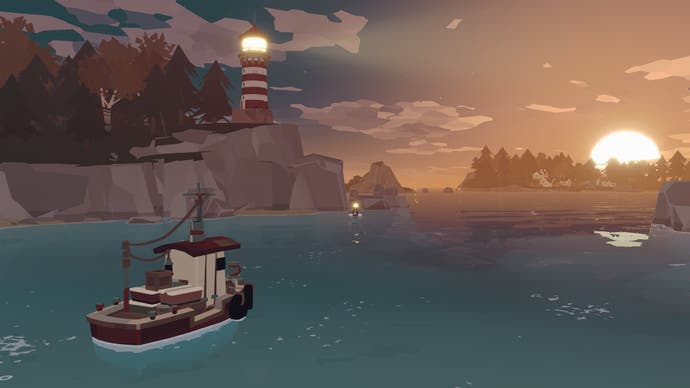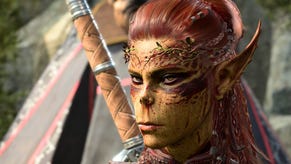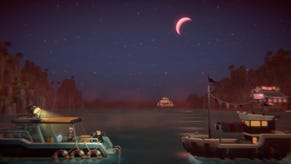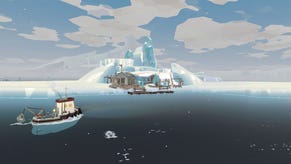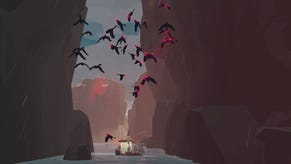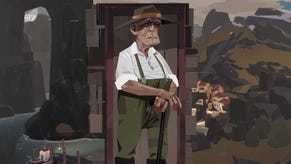Dredge review - a clever fishing sim, but an underwhelming horror game
Net worth.
Among the critters you'll draw from the deepest depths of direful fishing sim Dredge is the snailfish, an unhappy sea sausage which, as the game's encyclopaedia explains, starts to implode as it's reeled up into a tortuously low-pressure world. It's a fleeting reminder that being transported from abyss to surface is always a transformation. Beautiful aquatic creatures become abominations, crushed and deformed by the vicious operating parameters of a reality they aren't built for.
In Dredge's case, they acquire right angles, each lush 2D fish illustration the core of a clump of blocks, which must be slotted into a cargo hold represented as an expandable grid. It's a bloodless short-cutting of real-world commercial fish processing, where creatures are hacked up into tradeable morsels on the deck before they've even finished suffocating. Smaller critters like the snailfish (which doesn't in fact implode here, despite the description) fill a couple of squares, and are easily plugged into gaps between your ship's engine or headlamps and the hull. Chunkier hauls like sharks form awkward, rectilinear Christmas trees of fins and jaws: cramming in more than one is always a challenge, but perhaps if you reshuffle your mackerels a bit, you'll magically make room.
This touch of spatial puzzling lends Dredge's fishing expeditions their difficulty curve as much as the threats that roam the game's 19th century archipelago by night. Each voyage is sort of like deliberately filling up the board in Tetris, risking a game-over only to clear multiple lines in one fell swoop when you drop your catch off at the market. It's the One Clever Mechanic at the heart of a 10-hour game of fishquests and upgrading, which is disquieting in many ways but seldom as actively, rewardingly horrific as it might seem at first.
Dredge begins with your character - a saltwater cousin of Darkest Dungeon's granite-faced Ancestor - piloting aimlessly through the fog. Following the inevitable shipwreck, you wake on the dock of Greater Marrow, a neat little woodpile of shipyards and markets below a candy-striped lighthouse. The mayor immediately loans you a new tub and enlists you as official town fisherman. What happened to the previous fisherman? Where is all this bizarre mist coming from? And why is the lighthouse keeper giving you stinkeye? Oh, no need to worry about all that, for a few hours at least. Just cast your line!
Fishing spots throng the surrounding ocean, marked by bubbles with grey silhouettes idling beneath, easily glimpsed in all weather conditions as you trundle about in your initially underpowered vessel. In keeping with virtual fishing at large, Dredge's system is a collection of reflex-driven minigames – for example, hit a button when a rotating cursor touches a green zone to pull the catch in faster. Many of the fish you'll catch are familiar species: darting squid in the temperate shallows, red snappers in the southern tropics, enormous eels below the crags due north. But every now and then, you'll haul up something you don't quite recognise, like an octopus whose tentacles have heads.
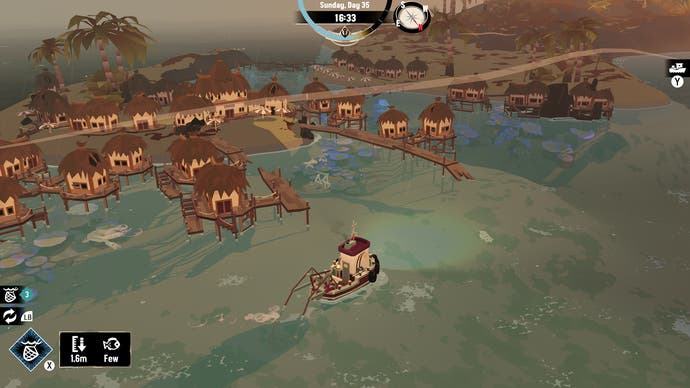
Some of these sinister mutations riff on scarier real-world critters like the infamous Anglerfish, with its bioluminescent lure. Others are flopping Jungian metaphors for the aggression and avarice of the surface-dwellers: a flounder that is all eye, a shark with a maw as long as its own body. All command a higher price at each major island's fish market than the species they're derived from. Say what you like about abyssal perversions, they apparently make for great eating.
You spend the cash from each haul on repairs and upgrades – in particular, more cargo space and specialised fishing equipment that lets you harvest different ocean regions, from sizzling volcanic waters to the deepest 'hadal' zones. You'll also salvage debris such as planks, pieces of clockwork and bolts of cloth, which are needed for the grander upgrades, mysterious bottled messages, and melancholy lost treasures to flog to the world's sole trader in non-piscine goods.
In parallel to your expanding fishing capabilities, you take on simple, two-step story quests that lead you around and between islands, generally searching for a special breed of fish, with the odd puzzle wrinkle such as finding explosives to clear a tunnel. There's only one major questline: a secluded Collector has a list of eldritch artefacts to dredge from each region, doubtless for entirely innocent purposes. In return, he offers cursed yet practical supernatural powers, such as teleporting to the world map's centre or exhausting a fishing spot with a word. Netting these arcane objects generally means dealing with some local, secondary difficulty – helping a marooned aeroplane pilot escape a mangrove swamp that keeps changing its own layout, or aiding a scientist in her study of the vast, grumpy cephalopod at the heart of a tropical reef.
It's a straightforward enclosing framework of bite-sized narrative elements and market-proven progression systems - straightforward to the point of sleepy. Dredge wants to be a balance of chillax loot 'em-up and nautical survival horror, but it leans towards the former. Sunless Sea is an obvious influence, but where Failbetter's game fixes your view on the ominous ocean floor (which sometimes looks back), this one lets you gaze away across beautifully buckling waves that cry out to be ploughed through. On a clear day, it might as well be Wind Waker.
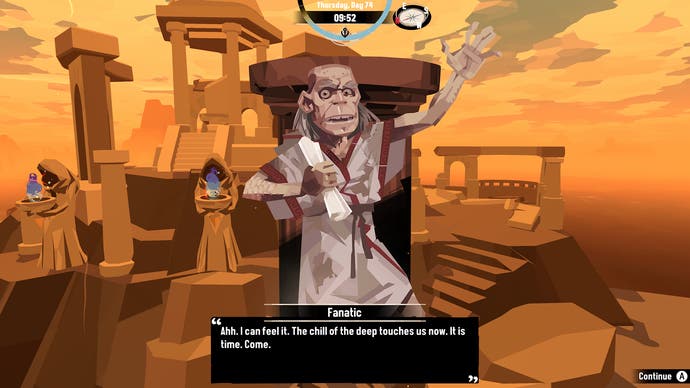
It gets more alarming after dark, however. Almost every in-game action in Dredge, from turning your ship's wheel to hauling a mournful coelacanth from its primordial haven, moves the sun through the sky. After it goes down, fog saturates the ocean, making navigation treacherous without a powerful spotlight, and various hazards emerge. You have to worry about not just your ship - which loses both hull points and, annoyingly, cargo given the slightest brush with a solid object that isn't a dock jetty - but also, your character's sanity, as indicated by an opening and closing eye. The twitchier that eye, the nastier and more supernatural the ocean becomes, with outlines degrading and doubling into anaglyph-3D-style hues, and rocks materialising inches from your bow.
Initially creepy, both these and the more active, free-roaming hazards lose their dread as your ship gets tougher with upgrades and the resource-upgrade loop deadens you to the dangers ahead. Soon enough, you're braving the sunset to hunt species that only appear after dark. But that tethering of time to movement remains a gentle source of suspense, partly because when you stop to peer around you're effectively paralysing the universe. Enemies are easily evaded, even before you acquire a sorcerous power that briefly repels them, but shouldn't be taken lightly. They all move about according to their own, independent idea of time, so there's no halting mid-pursuit to make silly faces at a stop-clocked behemoth from the stern.
Judged against other RPG-inflected exploration games, Dredge's key failing is it doesn't evolve much. Later, there are dabs of automated production in the shape of crab pots and drift nets, the former attracting crustaceans for you to collect a few days later, the latter passively scooping up fish in your wake (and serving as a highly convenient second inventory). Beyond that, the major point of differentiation over the course of the game is increasing speed, which gives you the confidence to undertake longer voyages, without really altering your methods. The plot doesn't develop much, either: if you have any familiarity with Lovecraft or Gothic sea stories, you'll scry its sunken secrets a mile away. There are several endings, hinging on a single lategame revelation and accompanying Big Decision that can be easily reloaded and reversed.
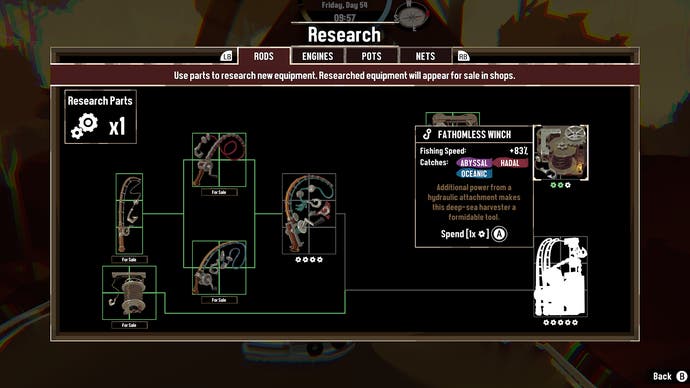
It's a shame Dredge proves such smooth sailing on the whole, because I think blending fishing with horror speaks to a wider imaginary affinity between oceans and video game code that might have been the basis for something pleasantly freakish. One of Dredge's more tantalising, unfulfilled ideas is it presents itself as cutting across the murky divide between the seen and unseen aspects of the simulation - its core mechanic the act of reaching down from the graphics layer into a fathomless extent of game data. The game's own loading screen message portrays rendering its visible world as "dredging the depths". In a project more committed to horror than playability or polish, this conceit might have been an opportunity for ghastly surprises of some kind – fish that outright refuse to be incorporated into the progression systems, 'sanity effects' that are actively mind-bending rather than just a source of friction - as though the watery unknowns beneath were eroding the game's placid archipelago of quest-loot-upgrade conventions.
But perhaps there's something more horrific about how Dredge cheerfully squares off its own weirder flourishes, dropping a line into another dimension only to reel in creatures already blocked-out for storage and sale, which captures the plot theme of the ocean as a monstrous mirror for human appetites more effectively than the plot itself. The mutant fish might sound appalling from their encyclopaedia descriptions, but it's all just set dressing – they arrive ready-formed into the same, gratifying Tetronimoe shapes as their 'normal' brethren. It's not what they are, really, but that insatiable grid inventory that makes them hideous.
